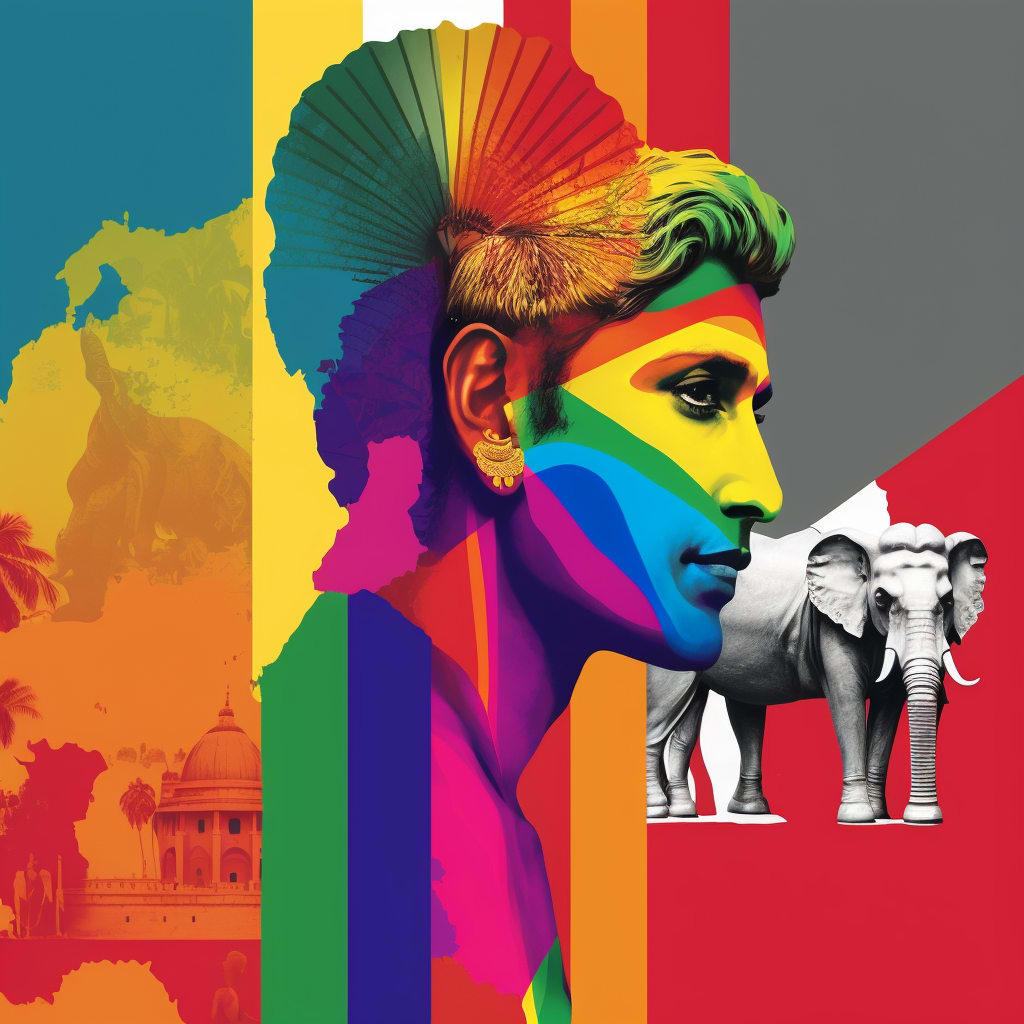LGBTQ+ in India
"Embracing Diversity, Fostering Equality: The LGBTQ+ Journey in India."

The LGBTQ+ community in India has a rich and diverse history that has been shaped by a variety of cultural, religious, and societal attitudes over time. Despite India being home to some of the world's oldest recorded expressions of same-sex love and gender diversity, such as in ancient Hindu texts, the reality for the LGBTQ+ community in modern-day India is much different.
In recent years, the rights of the LGBTQ+ community in India have become a topic of public debate and controversy, particularly with the upholding of Section 377 of the Indian Penal Code in 2013. This law criminalized homosexuality and had a profound impact on the lives of many LGBTQ+ individuals in India, leading to increased discrimination, violence, and marginalization.
However, the situation for the LGBTQ+ community in India changed dramatically in 2018 when the Indian Supreme Court finally struck down Section 377, decriminalizing homosexuality. This historic ruling was met with celebration and relief by the LGBTQ+ community, as well as its allies, who saw it as a significant step forward for LGBTQ+ rights in India.
Despite this progress, there is still much work to be done in terms of advancing the rights of the LGBTQ+ community in India. One of the biggest challenges faced by the LGBTQ+ community in India is discrimination and stigma. Despite the repeal of Section 377, the LGBTQ+ community still faces significant discrimination in many areas of their lives, including employment, education, and healthcare. This can make it difficult for LGBTQ+ individuals to fully participate in society and to lead fulfilling and healthy lives.
For example, many LGBTQ+ individuals face discrimination in the workplace, which can lead to limited employment opportunities and decreased financial stability. This can be especially challenging for transgender individuals, who often face significant barriers in finding employment due to discrimination and stigma. This can lead to poverty and financial insecurity, which can have negative impacts on their mental and physical health.
Another major challenge faced by the LGBTQ+ community in India is a lack of access to healthcare. Many healthcare providers lack training and education on the unique health needs of the LGBTQ+ community, which can result in inadequate care and treatment. This is especially true for transgender individuals, who often face barriers in accessing gender-affirming healthcare services, such as hormone therapy and gender reassignment surgeries.
In terms of education, LGBTQ+ students in India often face bullying, harassment, and discrimination in schools and universities. This can lead to decreased educational attainment and limited opportunities for academic and professional success. Additionally, LGBTQ+ individuals often face discrimination in accessing education, which can further limit their opportunities for personal and professional growth.
The lack of legal recognition for LGBTQ+ individuals and relationships is another major challenge faced by the LGBTQ+ community in India. While the repeal of Section 377 was a significant step forward, the LGBTQ+ community in India still lacks many of the legal protections and rights afforded to heterosexual couples. This includes the right to marry, the right to adopt children, and the right to inherit property. These legal barriers make it difficult for LGBTQ+ individuals to form and maintain stable and loving relationships, which can have negative impacts on their mental health and well-being.
Despite these challenges, there are also many positive developments for the LGBTQ+ community in India. For example, there has been a growing recognition of the importance of LGBTQ+ representation and visibility in popular culture. This has led to increased visibility for the LGBTQ+ community in films, television shows, and other forms of media. Additionally, there has been a growing movement for LGBTQ+ rights in India, with many advocacy organizations working to raise awareness and push for legal and policy changes to benefit the LGBTQ+ community.
For example, organizations like the Humsafar Trust and the Naz Foundation have been working for decades to advance the rights of the LGBTQ+ community in India. These organizations provide crucial support and resources to the LGBTQ+ community, including counseling, legal assistance, and HIV/AIDS education and prevention.
Another positive development for the LGBTQ+ community in India is the growth of LGBTQ+-friendly spaces, such as bars, clubs, and community centers. These spaces provide a safe and supportive environment for LGBTQ+ individuals to socialize, network, and connect with others who share similar experiences and challenges.
There are also growing efforts to educate the broader public about the LGBTQ+ community in India. This includes education and awareness-raising campaigns, as well as efforts to combat hate speech and discrimination against the LGBTQ+ community. These efforts are critical for promoting understanding and acceptance of the LGBTQ+ community and for creating a more inclusive and equitable society for all.
while there has been significant progress for the LGBTQ+ community in India, there is still much work to be done to ensure that all LGBTQ+ individuals have equal rights and opportunities. This includes addressing discrimination and stigma, improving access to healthcare, and advocating for legal recognition and protections for LGBTQ+ individuals and relationships. By working together and advocating for the rights of the LGBTQ+ community, we can build a more inclusive and equitable world for all.

In addition to the challenges faced by the LGBTQ+ community, there are also challenges in terms of intersectionality. For example, individuals who belong to multiple marginalized communities, such as those who are both LGBTQ+ and members of a lower caste or religious minority, may face compounded forms of discrimination and oppression. It is important for the LGBTQ+ rights movement to be inclusive and intersectional, recognizing and addressing the unique challenges faced by individuals from diverse backgrounds.
There have also been efforts to address the challenges faced by the LGBTQ+ community through legislation and policy changes. For example, in 2019, the Indian government introduced the Transgender Persons (Protection of Rights) Bill, which aimed to protect the rights of transgender individuals and provide them with legal recognition. While the bill was met with criticism by some members of the LGBTQ+ community, who felt that it did not go far enough in addressing the challenges faced by transgender individuals, it was a significant step forward in terms of advancing transgender rights in India.
Another important aspect of the LGBTQ+ rights movement in India is the role of allies. Allies play a crucial role in advocating for the rights of the LGBTQ+ community and creating a more inclusive and accepting society. This can include speaking out against hate speech and discrimination, educating others about LGBTQ+ issues, and supporting LGBTQ+ individuals and organizations.
Finally, it is important to acknowledge that progress towards LGBTQ+ rights and equality in India is not linear, and there will likely be setbacks and challenges along the way. However, it is essential to continue working towards a more inclusive and accepting society for the LGBTQ+ community. By working together and advocating for the rights of the LGBTQ+ community, we can build a world where all individuals are free to love and live openly and authentically, regardless of their sexual orientation or gender identity.
In conclusion, the LGBTQ+ community in India has a rich and diverse history and faces significant challenges in terms of discrimination, stigma, and lack of legal recognition and protections. However, there have also been positive developments in recent years, including the repeal of Section 377 and the growth of LGBTQ+-friendly spaces and advocacy organizations. By continuing to work towards greater equality and inclusiveness for the LGBTQ+ community, we can build a world where all individuals are valued and respected, regardless of their sexual orientation or gender identity.
About the Creator
Akilan Tharsiyus
"I am Akilan Tharsiyus, a photographer & writer capturing beauty & emotions of the world. With passion for storytelling, I bring unique perspective to projects & deliver high-quality content that inspires & leaves a lasting impression."






Comments
There are no comments for this story
Be the first to respond and start the conversation.